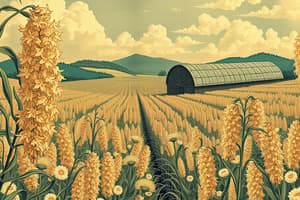Podcast
Questions and Answers
Which practice helps maintain soil health through varying crops over time?
Which practice helps maintain soil health through varying crops over time?
- Crop rotation (correct)
- Chemical herbicides
- Organic farming
- Soil testing
What does Integrated Pest Management (IPM) primarily involve?
What does Integrated Pest Management (IPM) primarily involve?
- Eliminating all pests completely
- Planting resistant crop varieties (correct)
- Routine soil moisture monitoring
- Exclusively using chemical pesticides
Which irrigation technique is suitable for minimizing water usage?
Which irrigation technique is suitable for minimizing water usage?
- Drip irrigation (correct)
- Surface irrigation
- Flood irrigation
- Sprinkler irrigation
What is one benefit of using conservation tillage in crop management?
What is one benefit of using conservation tillage in crop management?
How does precision agriculture enhance crop management?
How does precision agriculture enhance crop management?
Flashcards are hidden until you start studying
Study Notes
Crop Management
-
Definition: Crop management involves practices and techniques used to optimize crop growth, yield, and quality.
-
Key Components:
-
Soil Management:
- Soil testing to assess nutrient levels.
- Use of organic and inorganic fertilizers.
- Crop rotation to maintain soil health.
-
Water Management:
- Irrigation techniques (drip, sprinkler, flood).
- Rainwater harvesting.
- Soil moisture monitoring.
-
Pest and Disease Control:
- Integrated Pest Management (IPM) strategies.
- Use of resistant crop varieties.
- Biological control methods.
-
Weed Management:
- Mechanical weeding (tillage, hoeing).
- Chemical herbicides.
- Mulching and cover crops.
-
Crop Selection:
- Choosing suitable crops for the climate and soil.
- Considering market demand and economic viability.
- Assessing crop rotation benefits.
-
-
Sustainable Practices:
- Conservation tillage to reduce soil erosion.
- Organic farming for ecosystem health.
- Agroforestry and intercropping for biodiversity.
-
Technology in Crop Management:
- Precision agriculture using GPS and sensors.
- Drones for monitoring crop health.
- Data analytics for yield forecasting.
-
Crop Monitoring:
- Regular field assessments for growth tracking.
- Use of remote sensing technology.
- Yield mapping to evaluate performance.
-
Economic Aspects:
- Cost-benefit analysis for inputs and management practices.
- Market trends influencing crop choices.
- Access to credit and financial planning for farmers.
-
Regulatory Considerations:
- Compliance with environmental regulations.
- Understanding land-use policies.
- Certification standards for organic and sustainable practices.
Crop Management Overview
- Crop management optimizes growth, yield, and quality of agricultural crops.
Key Components
Soil Management
- Soil testing evaluates nutrient levels, ensuring appropriate fertilization.
- Combination of organic and inorganic fertilizers enhances soil fertility.
- Crop rotation maintains soil health and prevents nutrient depletion.
Water Management
- Various irrigation techniques: drip, sprinkler, and flood systems are used to efficiently manage water supply.
- Rainwater harvesting captures and utilizes natural precipitation for irrigation.
- Soil moisture monitoring ensures adequate watering based on crop needs.
Pest and Disease Control
- Integrated Pest Management (IPM) incorporates multiple strategies to mitigate pest impact.
- Resistant crop varieties reduce vulnerability to diseases.
- Biological control methods use natural predators to manage pests.
Weed Management
- Mechanical weeding methods like tillage and hoeing physically remove weeds.
- Application of chemical herbicides targets unwanted plants effectively.
- Use of mulching and cover crops helps suppress weed growth naturally.
Crop Selection
- Choosing crops aligned with climate and soil conditions boosts growth success.
- Market demand and economic viability influence crop selection strategies.
- Assessing crop rotation benefits improves soil health and crop variety.
Sustainable Practices
- Conservation tillage minimizes soil erosion while maintaining soil structure.
- Organic farming promotes ecosystem health, reducing chemical input reliance.
- Agroforestry and intercropping enhance biodiversity and farm productivity.
Technology in Crop Management
- Precision agriculture utilizes GPS and sensors to optimize agricultural operations.
- Drones facilitate monitoring of crop health and identifying issues promptly.
- Data analytics provides insights for accurate yield forecasting and decision-making.
Crop Monitoring
- Regular field assessments track crop growth stages and health.
- Remote sensing technology enables wide-area monitoring for better resource management.
- Yield mapping evaluates performance, aiding in future planning and adjustments.
Economic Aspects
- Conducting cost-benefit analysis aids in evaluating inputs and management practices.
- Understanding market trends is crucial for selecting profitable crops.
- Access to credit and effective financial planning supports farmers in managing operations.
Regulatory Considerations
- Compliance with environmental regulations is essential for sustainable farming.
- Familiarity with land-use policies ensures responsible land management.
- Certification standards for organic and sustainable practices affect marketability and consumer trust.
Studying That Suits You
Use AI to generate personalized quizzes and flashcards to suit your learning preferences.




